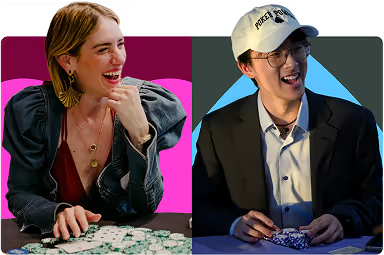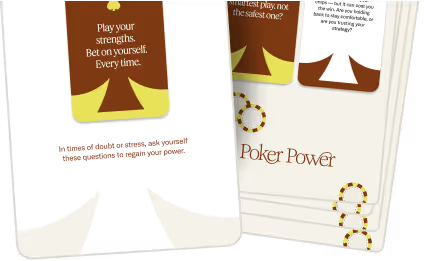Originally published on www.marketplace.org
Listen to the podcast here.
More women than men get bachelor’s degrees, master’s degrees and Ph.D. degrees. Yet boardrooms and executive positions are still dominated by men.One idea on how to bridge that gap? Poker.
Erin Lydon is president of Poker Power, an organization with the goal of teaching 1 million women and girls around the world how to play the game. She joined Marketplace’s Kai Ryssdal to talk about what poker teaches a player and how that can be applied in a career. An edited transcript of their conversation is below.
Kai Ryssdal: So you want to teach a million girls and women to play poker. First of all, why?
Erin Lydon: It’s the game of poker, but it’s really the game of life. And through playing this game, you will learn how to problem solve with imperfect information. You’ll learn how to get more comfortable taking risk. You’ll learn how to bet and bluff. And these are all really key leadership skills, no matter where you are in your career, or if you’re just getting ready to head off to college and you haven’t even stepped on the ladder yet.
Marketplace
Hosted by Kai Ryssdal

LATEST EPISODES
- The business of getting offices back in business
- Sep 25, 2023
- The early bird gets the worm
- Sep 22, 2023
- 50 years after the oil embargo, the U.S. is playing catch-up
- Sep 21, 2023
Ryssdal: We should say here, you have worked on Wall Street. You’ve been sort of in that arena, as it were, and I imagine that’s kind of why you are as involved and passionate about this as you are.
Lydon: That is true. I started my finance career at JPMorgan, and that was 1999. So that’s where I say, you know, pay was secret and pregnancy was hidden. And so for more than 20 years now, I have been working on ways to help empower women, especially around equal pay. And what I like to say is, “Play poker.” And I know it sounds crazy, but it truly is the most impactful personal thing that you can do for yourself. And it has nothing to do with, you know, the gambling and transacting in real money, because we don’t do any of that at Poker Power. And it’s all around developing the skills and strategies.
Ryssdal: Do we know that teaching people — women or girls specifically — but do we know that teaching people to play Texas Hold’em or whatever actually inculcates these skills in them?
Lydon: You know, there’s quite a bit of research with financial firms in particular where poker is part of the culture of a firm. We know that there actually was an article that the Fed put out around, you will be a better trader, if you learn to think like a poker player. What Poker Power is doing, because we also would like to have some real hard data around this, is we are running a number of studies with some of the top universities right now to follow a group cohort through our program.
Latest Stories on Marketplace
- Climate change means more extremes for Washington hops farmer
- In some cities, domestic workers are entitled to contracts. Many never get one.
- Bringing back the lost art of office etiquette
Ryssdal: Obviously, you want to start people within reason as young as possible so that they can develop these skills and thus improve those skills over time. Have you had to have conversations with parents about that? “I don’t want my 14-year-old learning how to play poker.” Or is that just not a thing?
Lydon: Well, no, it definitely is a thing. And my first question is, “Would you let your son play? Because if he goes to summer camp, I guarantee he’s playing it.” You know, stereotypically, poker is a boys’ club. You know, it’s booze, it’s betting, it’s a smoky basement. It’s all the places that women don’t feel comfortable. And that’s what we’re trying to shift. So yes, we’ve certainly had moms and dads who aren’t too keen on this. But I will tell you, we have taught thousands of girls, and we actually have a very successful program in Kenya where we’re teaching 5,000 high school and university girls to play poker.
Ryssdal: So once you get the million, which is your target, then what? Five million or 10 million, right? I mean, might as well.
Lydon: Yeah, there’s no end. And the million was put out there just as, you know, everybody needs a North Star that they’re shooting towards. But we want half the world. And half the world is women. So we want half the world playing poker.
Ryssdal: What’s your favorite game?
Lydon: Well, we only teach Texas Hold’em.
Ryssdal: What about you though, right? I mean, Texas Hold’em is Texas Hold’em. But what about you? Do you play?
Lydon: I play a lot, yeah. And it’s funny because I was not a poker player and I was very trepidatious to run this company because I didn’t know how to play. And I actually realized about a year in that I was truly the target market. This is a game that I had been surrounded by when I was on Wall Street. And I never took my seat and I never asked if I could take my seat. And now that I play, I am personally benefiting from it, but I’m also sharing the experience with all these new women who never saw themselves at a poker table.
Ryssdal: Yeah, it’s interesting, I was gonna wrap it up, but there was one more thing that you said that prompts me to ask this question: So you get the girls in the game, you get the women in the game, and they learn the skills in the game. But it’s asking for a seat at the table. That’s the first challenge, right?
Lydon: That’s exactly the key to all of this. You want to see where you want to be, and we all know we have to see it to be it, and then you have to pull out the seat. And, at Poker Power, we are highly inclusive to anyone who wants to learn with us. And so there are no barriers to taking your seat, which is so critical to getting what you want out of life.





